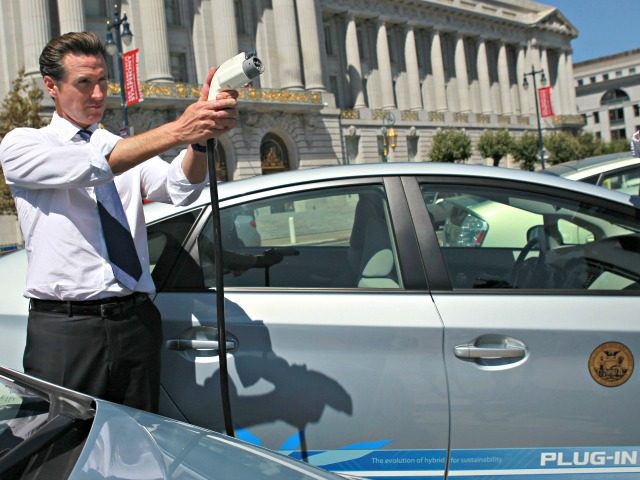A Rasmussen survey of 1,000 adults shows only 28 percent believe electric vehicles are “practical for most drivers.” Meanwhile, a clear majority of 54 percent say they are not. Eighteen percent are unsure.
When asked to look a decade into the future, which will be just a few years before California outlaws gas-powered vehicles, a whopping 69 percent say it is “very” (37 percent) or “somewhat” (32 percent) likely that most cars will run primarily on gasoline. Only 23 percent disagree.
A relative of mine owns an electric car. Fully electric. A Tesla. For him, it’s perfect. He commutes every day. He drives it to work, runs a few errands along the way, comes home, plugs it in. He earns a good living and could afford that sucker. All’s right with the world. His wife, however, drives a regular car. You want a car-car for backup.
The drawbacks of electric cars are legion. I can’t imagine owning one. My wife and I are campers. We drive hundreds of miles at a time. An electric car simply isn’t practical unless you use it in a regimented way where 1) you know you will not run out of battery power, and 2) you know there’s a place to plug it in in time.
Let’s start with the fact that the cost of an average electric car is $20,000 more than the price of a gas-powered car. Are you really going to make up that $20,000 by not having to buy gas? Keep in mind that you are still paying for electricity.
Another problem is the electric car’s battery. Once that goes, the car is kaput because the replacement battery costs so much you might as well purchase a new car.
Those issues will likely be resolved over time. Fifteen years ago, a flatscreen TV cost $10,000. Today you can buy a 72-inch flatscreen for $700 at Walmart. America sucks at managing pandemics and the economy and crime and education, but anything involving mindless consumerism we nail in record time.
But how do you resolve this issue…

U.S. President Joe Biden in an electric hummer as he tours the General Motors Factory ZERO electric vehicle assembly plant in Detroit, Michigan on November 17, 2021. (MANDEL NGAN/AFP via Getty)
The beauty of a gas-powered car is that gas stations are everywhere, and it takes ten minutes to pull over, fill your car with hundreds of miles of energy, and get back on the road. No stress. No waiting. The whole concept is beautiful.
Sure, we might get to a point where electric vehicle charging stations are everywhere, but the time-suck is the issue.
- Level 1: About 5 miles of added range per hour of charging
- Level 2: About 25 miles of added range per hour of charging
- Level 3: About 200 miles of added range per hour of charging
Who wants to sit around for hours? As of right now, the future of recharging that electric vehicle is that Level 3, or one hour of charging to gain 200 miles, but those chargers are rare. Regardless of your options, first, you must find a charger or that Level 3 supercharger. Then you have to hope no one else is using it. If they are, you have to wait for them to finish… Who wants to wait a half hour to gain 200 miles of range? Isn’t it annoying enough waiting for someone to finish filling their tank?
Oh, and that Level 3 charging has a couple of major drawbacks… To begin with, “it’s typically more expensive to recharge an EV on a Level 3 charger than it is to refuel a gasoline car.” Secondly, “Level 3 charging puts more wear on an EV’s battery than does a slower, gentler charge from a Level 1 or Level 2 power supply. Your battery will last longer if you only choose Level 3 occasionally.”
Remember that your 200-mile charge doesn’t guarantee 200 miles of range. Steep hills, towing, using the air conditioner, the temperature outside… all of these things can knock those down those 200 miles.
Please don’t misunderstand me… I’m all for it if the auto industry can fix these problems. If they can do to the electric vehicle what they did with flatscreen TVs, that would be fantastic. Give the people what they want. That’s my motto.
But as of now or ten years from now…? I just don’t see it.
Some people may still buy them to feel smug and superior about saving Mother Earth. Except, they’re really not.
Follow John Nolte on Twitter @NolteNC. Follow his Facebook Page here.

COMMENTS
Please let us know if you're having issues with commenting.